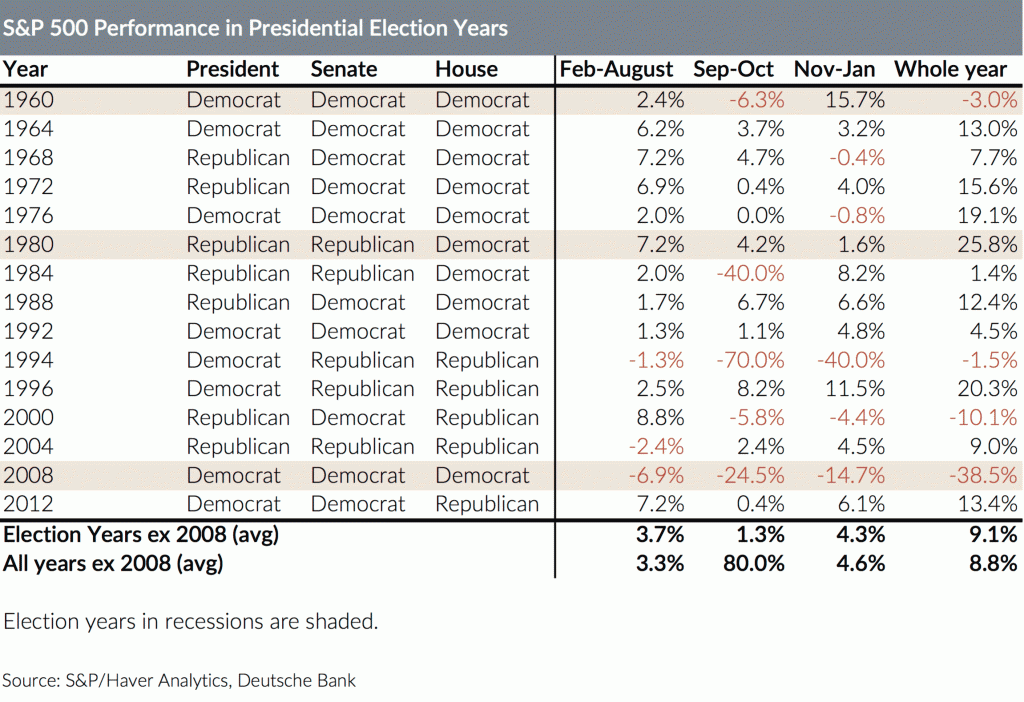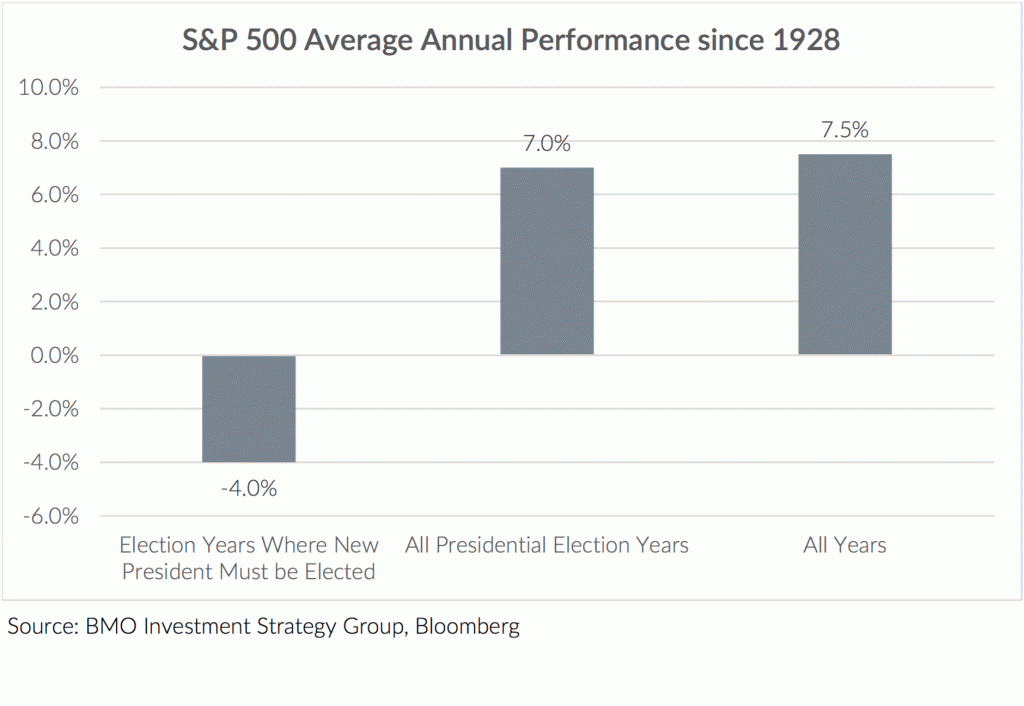By Mitchell Barr, Client Associate
Do you remember how you felt when you turned 16 years old? 30? 50? These are milestone birthdays when people tend to feel like they are going through a transformative change in their life. Think Molly Ringwald in the 80s film Sixteen Candles. Yet, after the fact, we generally find that not much has changed and age is just a number. Political elections often follow this same pattern, at least in terms of the stock market. There is a lot of concern going into this year’s election about potential adverse effects on the stock market and economy no matter whether Donald Trump or Hillary Clinton or Gary Johnson is elected. A small chance exists that this election could indeed be different from others, but let’s take a look at history to see how markets have performed in previous elections.

What can we deduce from this chart? Looking at the “Whole Year” column on the right, it’s hard to find any pattern that suggests an election either boosts or impedes market performance. Overall, the market has averaged a return of 9.1 percent in election years, excluding 2008, and a return 8.8 percent in all other years excluding 2008. A .03 percent increase is hardly anything to cheer about. However, this election is a little unique in that President Obama’s term is up and we have to elect a new president. The chart below depicts what happens when that is the case, looking all the way back to 1928.

This data seems to be more interesting, as the S&P 500 noticeably underperforms by about 11.5 percent, relative to all years during elections where we have to elect a new president. That number is significant if not for a few details: There have been twenty-two elections since 1928. Of those, a new president had to be elected in only seven of them (including 1928). It’s impossible to make a conclusion that we should expect the stock market to be down in those years with seven data points. For reference, statisticians usually require at least 30 samples for a statistic to be “significant” (if the data is normally distributed). Second, the economy is always at a different state for each new president to inherit, which is independent from any reaction to the election. For example, Barack Obama’s election in 2008 did not cause the subprime mortgage crisis, as it was already well underway. Lastly, there is a general belief among investors that markets are efficient at reflecting public information.
It is not a secret that we are electing a new president in November and everyone now knows who the candidates are. Undoubtedly, investors have collectively factored in this information already, so even though we may be expecting a 16th birthday-type of transformative change in the stock market on Election Day, we shouldn’t count on it like Molly Ringwald.
So why do people make such a big deal about the how an election will affect the stock market? It is true that the president has of power over many things, most notably the responsibility of Commander in Chief of the largest military in the world. If the new president fires missiles across the pond at Russia or China, our portfolios will definitely be in for a wild ride. However, any legislation that the new president wants to implement has to be passed through Congress, and the Supreme Court is there to serve as a check on both of them. That means that Mr. Trump can’t just go sit in a room with world leaders and renegotiate trade agreements and Ms. Clinton can’t just write a new tax code overnight. Even if the new president passes some new legislation that affects the economy, it will take years for the effects to be seen.
In the event that we are in for a down year or years, what can we do to protect ourselves? For starters, a well-diversified portfolio contains more than just U.S. stocks. At Versant Capital Management, we invest in U.S., foreign developed, and emerging markets. Not only that, but a typical diversified portfolio doesn’t just hold stocks, it also has allocations to bonds and alternative investments such as commodities. No matter what your political affiliation, the presidential election results cannot alone affect all of those asset classes in a positive or negative manner. When you submit your ballot on November 8th and go home to watch the results, you can rest easy knowing that age is just a number, there will continue to be more elections, and tomorrow is another day.
[mk_fancy_text color=”#444444″ highlight_color=”#ffffff” highlight_opacity=”0.0″ size=”14″ line_height=”21″ font_weight=”inhert” margin_top=”0″ margin_bottom=”14″ font_family=”none” align=”left”]Disclosure: Please remember that past performance may not be indicative of future results. Different types of investments involve varying degrees of risk, and there can be no assurance that the future performance of any specific investment, investment strategy, or product (including the investments and/or investment strategies recommended or undertaken by Versant Capital Management, Inc.), or any non-investment related content, made reference to directly or indirectly in this newsletter will be profitable, equal any corresponding indicated historical performance level(s), be suitable for your portfolio or individual situation, or prove successful. Due to various factors, including changing market conditions and/or applicable laws, the content may no longer be reflective of current opinions or positions. Moreover, you should not assume that any discussion or information contained in this newsletter serves as the receipt of, or as a substitute for, personalized investment advice from Versant Capital Management, Inc. To the extent that a reader has any questions regarding the applicability of any specific issue discussed above to his/her individual situation, he/she is encouraged to consult with the professional advisor of his/her choosing. Versant Capital Management, Inc. is neither a law firm nor a certified public accounting firm and no portion of the newsletter content should be construed as legal or accounting advice. If you are a Versant Capital Management, Inc. client, please remember to contact Versant Capital Management, Inc., in writing, if there are any changes in your personal/financial situation or investment objectives for the purpose of reviewing/evaluating/revising our previous recommendations and/or services. A copy of the Versant Capital Management, Inc.’s current written disclosure statement discussing our advisory services and fees is available upon request.[/mk_fancy_text]
